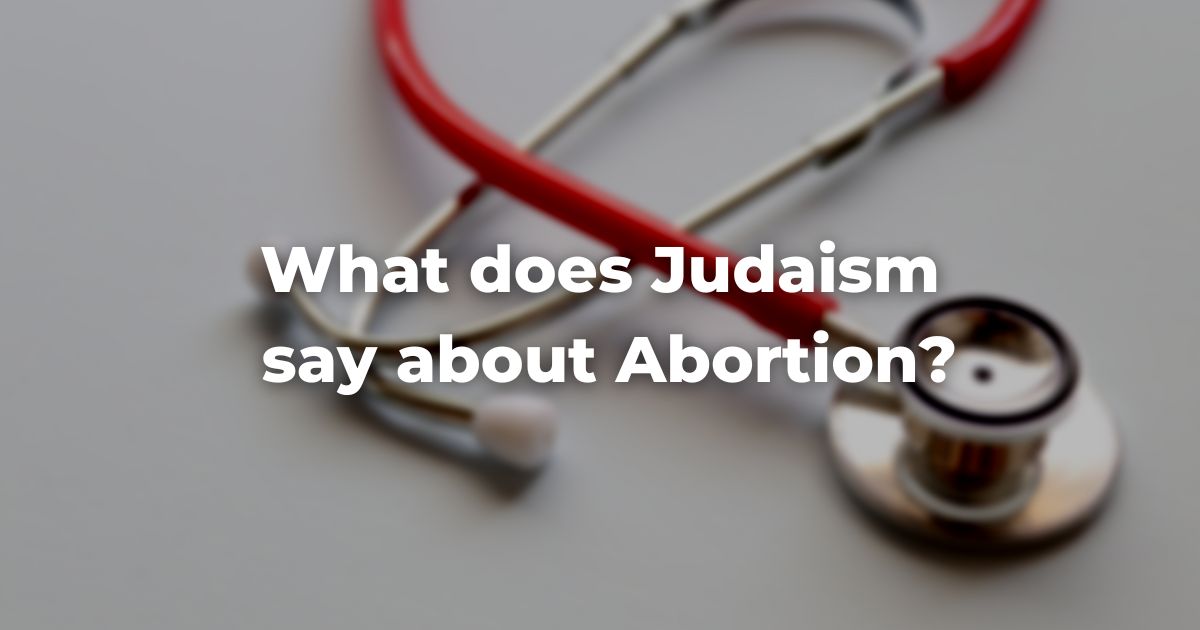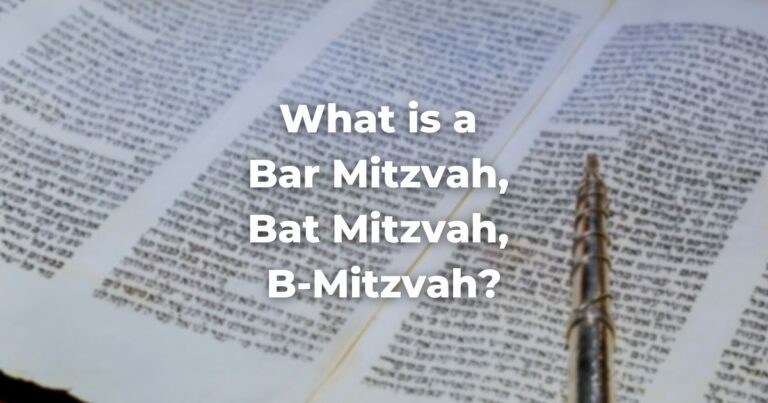Rabbi Susan Grossman and Rabbi Avram Reisner, authors of the two most recent decisions on abortion from the CJLS, have put together this article to better explain the overview of Jewish views of abortion.
You can read the full, foot-noted version here:
You can find more resources from the Rabbinical Assembly on abortion here:
Table of Contents
Judaism Values Life
The toast, “L’Hayim,” “To Life!,” exemplifies Judaism’s priority and commitment to protect and enhance life.
This commitment to life is reflected throughout Jewish law, based on the rabbinic understanding of the biblical words, v’hai bahem from Leviticus 18:5: “You shall keep My laws and My rules, by the pursuit of which human beings shall live (v’hai bahem); I am Adonai.”
According to Judaism, Life Begins at Birth
In Judaism, human life does not begin when the soul enters a fetus, unlike in Christianity today. Through the fortieth day following conception, the rabbis treat the fetus as mere liquid, maya b’alma (Mishnah Niddah 3:7, Babylonian Talmud Yevamot 69b).
Though the soul (neshamah) enters before birth (Genesis Rabbah 34:10), the fetus is not considered a person, lav nefesh hu, until birth (Rashi and Yad Ramah to Sanhedrin 72b).
Though cherished as a potential life, a fetus is expressly excluded from the category of human life in Jewish law (Babylonian Talmud Sanhedrin 84b).
This distinction between what is and is not considered human life under Jewish law significantly impacts Judaism’s historical approach to abortion, prioritizing the well-being of the mother.
According to Judaism, a Fetus is Part of its Mother’s Body
According to Jewish law, a fetus is considered part of its mother’s body until birth.
The classic rabbinic proof comes from the Bible, Exodus 21:22-23: If a pregnant woman is physically injured during a fight between two men so that a miscarriage, but no other harm, occurs, the perpetrator is fined. The rabbis read the verse to mean no other harm happens to the woman besides the miscarriage (Mekhilta de Rabbi Ishmael, Nezikin 8).
The loss of the fetus is not considered murder because it is considered part of the woman’s body (ubar yerekh imo hu); it has no independent legal identity.
That is why a pregnant woman who converts to Judaism gives birth to a Jewish child. No additional conversion ceremony is required because the fetus is legally considered part of the mother’s body when she converts and not a separate person in need of conversion (Babylonian Talmud Yevamot 78a, codified as Jewish law in the Shulhan Arukh, Yoreh Deah 268:6).
Judaism Allows and Sometimes Requires Abortion:
Recognizing the preciousness of potential life in every fetus, Jewish law generally does not permit the destruction of a fetus without cause. Where there is cause, Judaism permits abortion (Statement on the Permissibility of Abortion, Committee on Jewish Law and Standards, 1983).
In general, Jewish law prohibits needlessly “wounding the body” (habbalah) (Babylonian Talmud Bava Kama 90b). Wounding (e.g., surgery) is only permitted in order to heal.
Therefore, since the fetus is considered part of its mother’s body, Jewish law permits abortion to protect the mother’s health. Jewish law requires an abortion to protect the mother’s life because the mother’s life always takes precedence over the potential life of the fetus within her.
That is why even the strictest interpretations of Jewish law require an abortion to protect the mother’s life at all stages of the pregnancy, even after labor has begun (Mishnah Oholot 7:6).
The Mishnah permits an abortion until the head or most of the fetal body has emerged from the mother during birth. Even at this latest stage of the birth process, Jewish authorities still allow the fetus to be aborted if necessary to protect the mother’s life. (See Responsa Melammed L’Ho’il Vol. II, Yoreh Deah, no. 69).
In such cases, the physician can act on behalf of the mother, in effect as her agent.
Maimonides treats the fetus “like” a pursuer, a rodef, when the fetus endangers the mother’s health or life. Just as a pursuer must be stopped from endangering another by whatever means necessary, the fetus must be stopped from endangering its mother, even though its threat is not intentional. (Mishneh Torah Hilkhot Rotzeah u’Shmirat HaNefesh 1.9).
Jewish law permits abortion at all stages of pregnancy to protect the mother’s health.
In general, Jewish approaches to medicine prefer the most effective and least physically invasive methods possible to protect life and health. Therefore, Jewish law permits both medications and surgical abortions (Maimonides, ibid).
While Jewish law favors abortions performed as early as possible, late-term abortions are allowed and sometimes required, particularly when late-term complications can endanger a woman’s life or health, which includes her physical and mental health and her ability to bear future children.
Jewish law has long recognized a woman’s overall health includes her mental health.
Thus, an abortion may be performed to protect a woman from emotional distress. The classic example, though not relevant today, is found in the Talmud: An abortion must be performed on a pregnant woman condemned to death to save her from the emotional distress of miscarrying as the death sentence is carried out (Babylonian Talmud Arakhin 7a).
This precedent led later rabbis to consider under what other conditions an abortion could be permitted for maternal distress (Responsa She’elat Ya’avetz 1.43, Responsa Tzitz Eliezer 9.51).
The Conservative Movement’s Committee on Jewish Law and Standards (CJLS) has passed teshuvot permitting the abortion of a severely deformed fetus or a fetus with little chance for survival (such as with Tay Sachs), even in the eighth or ninth month, if continuing the pregnancy would cause significant emotional distress to the mother (e.g., Rabbi Avram Reisner, “Peri and Neonatology: The Matter of Limiting Treatment,” YD 339.1995, CJLS Responsa 1991-2000).
This consideration would clearly apply to permit abortion in cases of rape or incest (see Tzitz Eliezer reference above).
Some rabbinic authorities also permit abortion to protect the health of a woman’s current children, for example, to protect her milk supply if she is nursing (Responsa Beit Yehudah, Even HaEzer, 14) or, by extension, her ability to support them.
Judaism Recognizes the Right to Determine One’s Own Health Needs
The observance of almost any commandment, even fasting on the holiest day of the year, Yom Kippur, is subservient to the need to protect the life and health of oneself and others.
According to Jewish law, when doctors tell patients they must eat on Yom Kippur, even if they do not want to, they must follow their doctors’ orders (Mishnah Yoma 8.5).
However, if individuals feel they must eat on Yom Kippur for health reasons, even if their doctors do not require it, they are allowed to eat (Mishnah Yoma 5-6, Babylonian Talmud Yoma 83a).
In this way, rabbinic law was centuries ahead of its time regarding patients’ rights.
While Jewish law requires us to seek to heal ourselves and others, it also recognizes that individuals are the best and ultimate judges of their own needs; based on Proverbs 14:10, only the heart knows its own bitterness.
Therefore, to have or not have an abortion is a decision for the pregnant woman to make, for only she knows the bitterness of her own heart.
Hopefully, she will also consult her doctor, her rabbi, and, if appropriate and safe to do so, significant others. (On consulting significant others on abortion decisions, see Rabbi Susan Grossman, “Choosing Parenthood: ART, Adoption, and the Single Parent.”).
Advances in Medically Assisted Fetal Viability Do Not Change Judaism’s Position on Abortion
Public debate touches on how advances in neonatology (the care of newborns) should inform and extend abortion restrictions. The potential gestational age of viability has moved from the last trimester to as early as 23 weeks with access to proper care and facilities.
However, the earlier a baby is born, the lower its chance of survival and the greater its chance of abnormalities if it survives. (Elliot Dorff and Pamela Barmash, “CJLS Update on Abortion.”)
While Judaism prefers that abortion occur as early as possible, medical advances in neonatal viability do not change Judaism’s basic position on abortion.
Even if a fetus were carried full term, it would not be considered a human being until birth (Gur Aryeh to Exodus 21:22). A fetus in its mother’s body remains legally part of her body and is not yet a human life, regardless of gestational age or prospective viability.
Abortion remains permitted or required according to Judaism, depending on the mother’s level of need.
Judaism Requires Us to Heal Ourselves and Others
Opposition to abortion and women’s reproductive care primarily grew out of and continues to be fueled by a particular Christian theology that defines life as beginning from conception and abortion as murder.
Judaism has a different view: Life begins at birth, and abortion is required when necessary to save a woman’s life and is permitted to protect her physical and mental health.
The worldwide Conservative Masorti Movement actively supports efforts to protect women’s reproductive health and access to safe and legal abortion when necessary.
We do so from the perspective of a community that believes in our responsibility to protect the lives and health of ourselves and others. We also do so as a religious minority seeking the freedom to follow our religious dictates and conscience.
Legal efforts to protect women’s reproductive health care around the world have not focused on the rights of minority faiths.
Nevertheless, it is worth noting that laws restricting access to abortion and reproductive healthcare represent a particular Christian perspective. Such abortion restrictions deny individuals the right to follow their own religious beliefs and traditions.
In the United States, this is a right guaranteed under the First Amendment to the U.S. Constitution prohibiting the establishment of religion, specifically that government actions cannot unduly favor one religion over another.
Religious Minorities have the Right to Follow Their Traditions
Opposition to abortion and women’s reproductive care primarily grew out of and continues to be fueled by a particular Christian theology that defines life as beginning from conception and abortion as murder.
Judaism has a different view: Life begins at birth, and abortion is required when necessary to save a woman’s life and is permitted to protect her physical and mental health.
The worldwide Conservative Masorti Movement actively supports efforts to protect women’s reproductive health and access to safe and legal abortion when necessary. We do so from the perspective of a community that believes in our responsibility to protect the lives and health of ourselves and others.
We also do so as a religious minority seeking the freedom to follow our religious dictates and conscience.
Legal efforts to protect women’s reproductive health care around the world have not focused on the rights of minority faiths. Nevertheless, it is worth noting that laws restricting access to abortion and reproductive healthcare represent a particular Christian perspective.
Such abortion restrictions deny individuals the right to follow their own religious beliefs and traditions. In the United States, this is a right guaranteed under the First Amendment to the U.S. Constitution prohibiting the establishment of religion, specifically that government actions cannot unduly favor one religion over another.
Learn More
The Classic Committee on Jewish Law and Standards Teshuvot on Abortion and Contraception:
- Ben Zion Bokser and Kassel Abelson, “Statement on the Permissibility of Abortion” (1983)
- David M. Feldman, “Abortion: The Jewish View” (1983)
- Robert Gordis, “Abortion: Major Wrong or Basic Right?” (1983)
- Kassel Abelson, “Prenatal Testing and Abortion” (1983)
- Kassel Abelson and Elliot Dorff, “Mitzvah Children“ (2007)
- Miriam Berkowitz and Mark Popovsky, “Contraception” (2010)
Rabbinical Assembly Statements:
- Statement on Reproductive Freedom (2019)
- Statement on the Texas Abortion Law (2021)
- Statement on US Supreme Court Decision to Overturn Abortion Rights (2022)
Rabbinical Assembly Resolutions:
This overview was approved by the Committee on Jewish Law and Standards of the Conservative Movement on November 28, 2023, by a vote of 19-0-0. Voting in favor: Rabbis Jaymee Alpert, Adam Baldachin, Pamela Barmash, Emily Barton, Suzanne Brody, Nate Crane, Elliot Dorff, David Fine, Joshua Heller, Barry Leff, Avram Reisner, Tracee Rosen, Rachel Safman, Robert Scheinberg, Miriam T. Spitzer, Ariel Stofenmacher, Ellen S. Wolintz-Fields. Voting against: None. Abstaining: None.
It has been lightly edited for Exploring Judaism in the interest of readability.
Authors
-

Rabbi Susan Grossman is Rabbi Emerita of Beth Shalom Congregation, Columbia, MD. Serving on the Conservative Movement’s Committee on Jewish Law and Standards for 30 years, she penned teshuvot on women as judges and witnesses, women’s reproductive healthcare, etc. She earned her doctorate in Ancient Judaism at JTSA. Author of numerous articles about women and Judaism, she is an editor of Etz Hayim Torah and Commentary and co-editor of Daughters of the King: Women and the Synagogue. Before becoming a member of the first class of women in JTSA’s rabbinical school, she led Holocaust programming for a national Jewish organization.
-



Rabbi Avram Israel Reisner is rabbi emeritus at Chevrei Tzedek Congregation in Baltimore, MD. He is a long-standing member of the Conservative Movement's Committee on Jewish Law and Standards. He earned a PhD in Talmud at JTSA and an MA in Bioethics at the University of Pennsylvania and serves as an appointee on the Maryland Stem Cell Research Commission. He is the author, most recently, of a teshuvah on eating at vegetarian restaurants and co-author of one on the mitzvah of sustainability. He has authored other significant teshuvot on End-of-Life Treatment, Genetically Modified Food and Forming a Minyan Over the Internet, and is a co-author of the landmark teshuvah permitting same-sex marriage.




